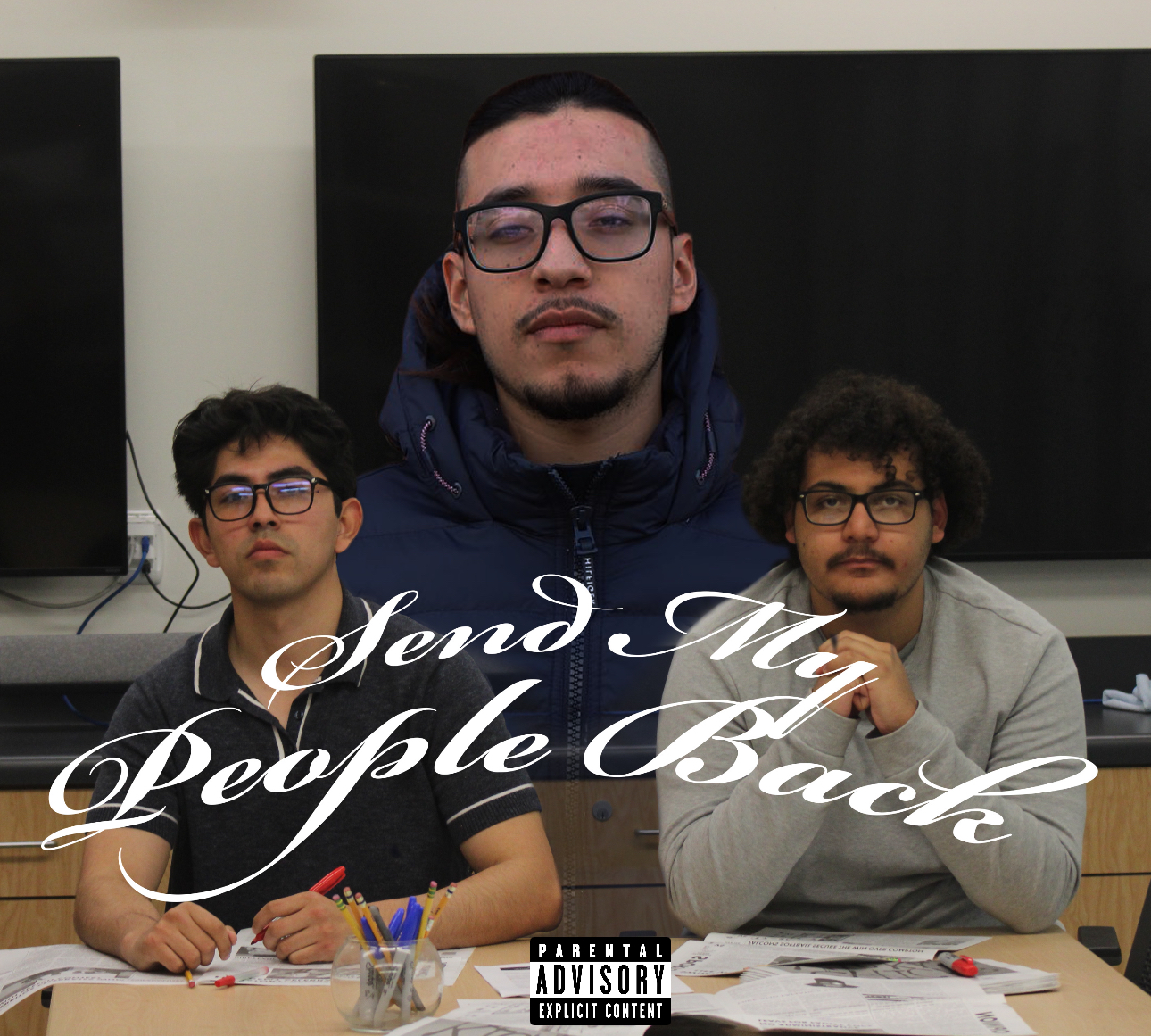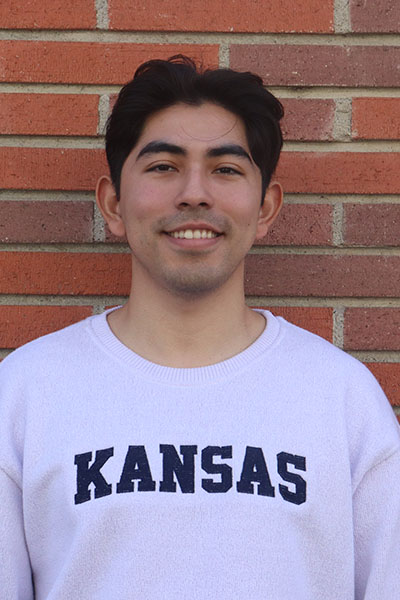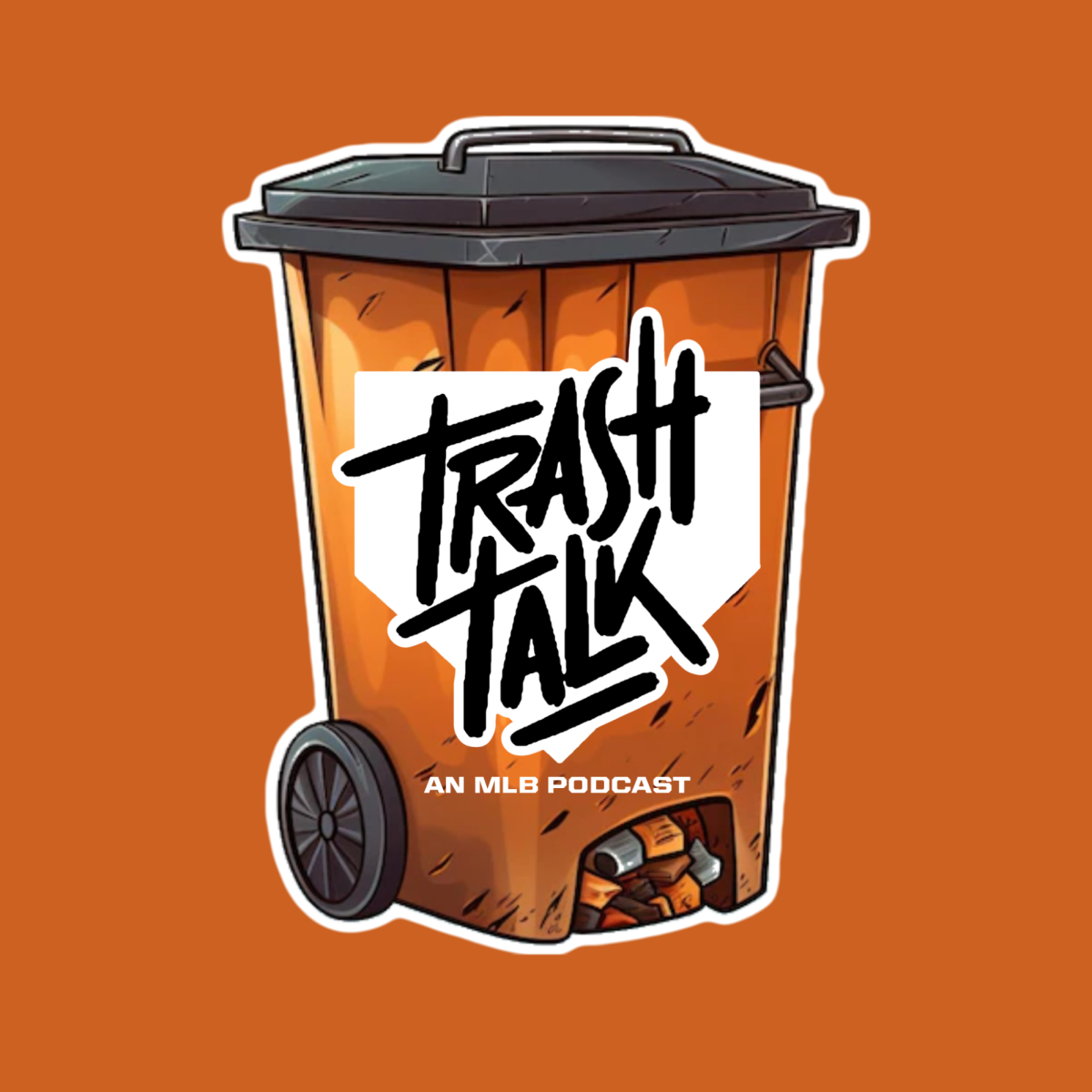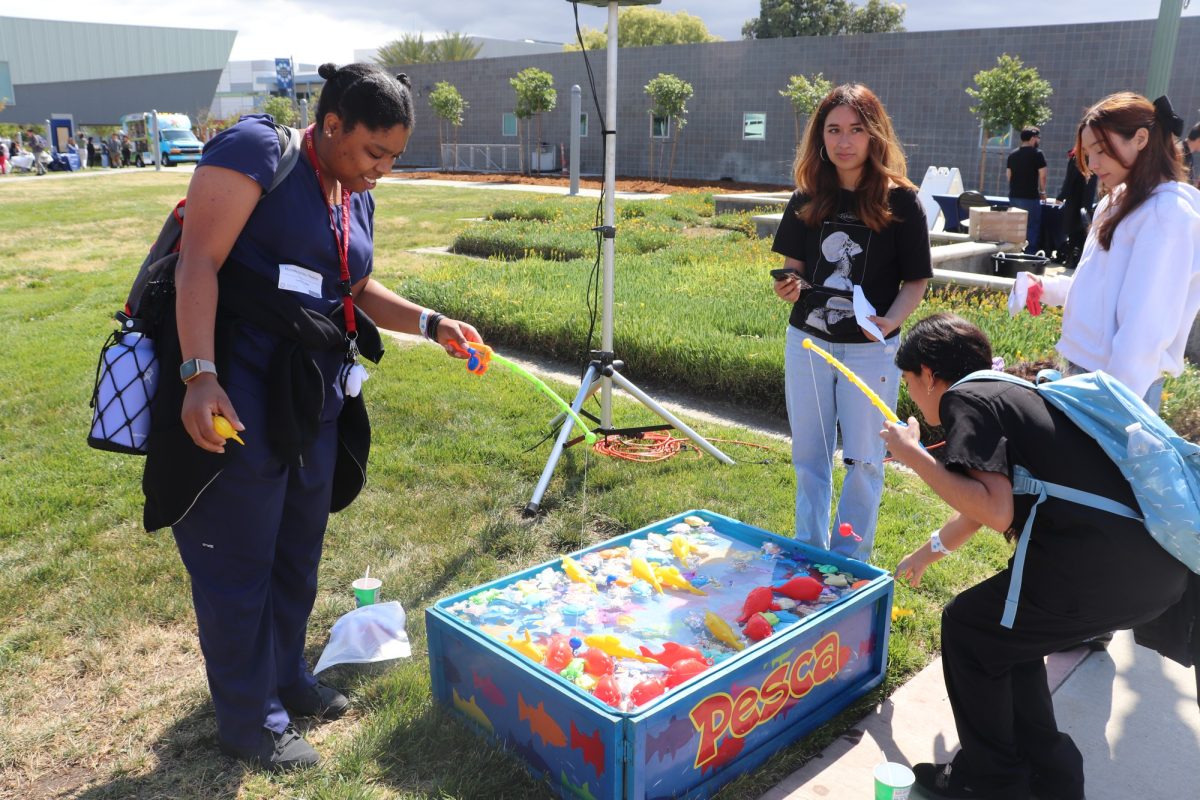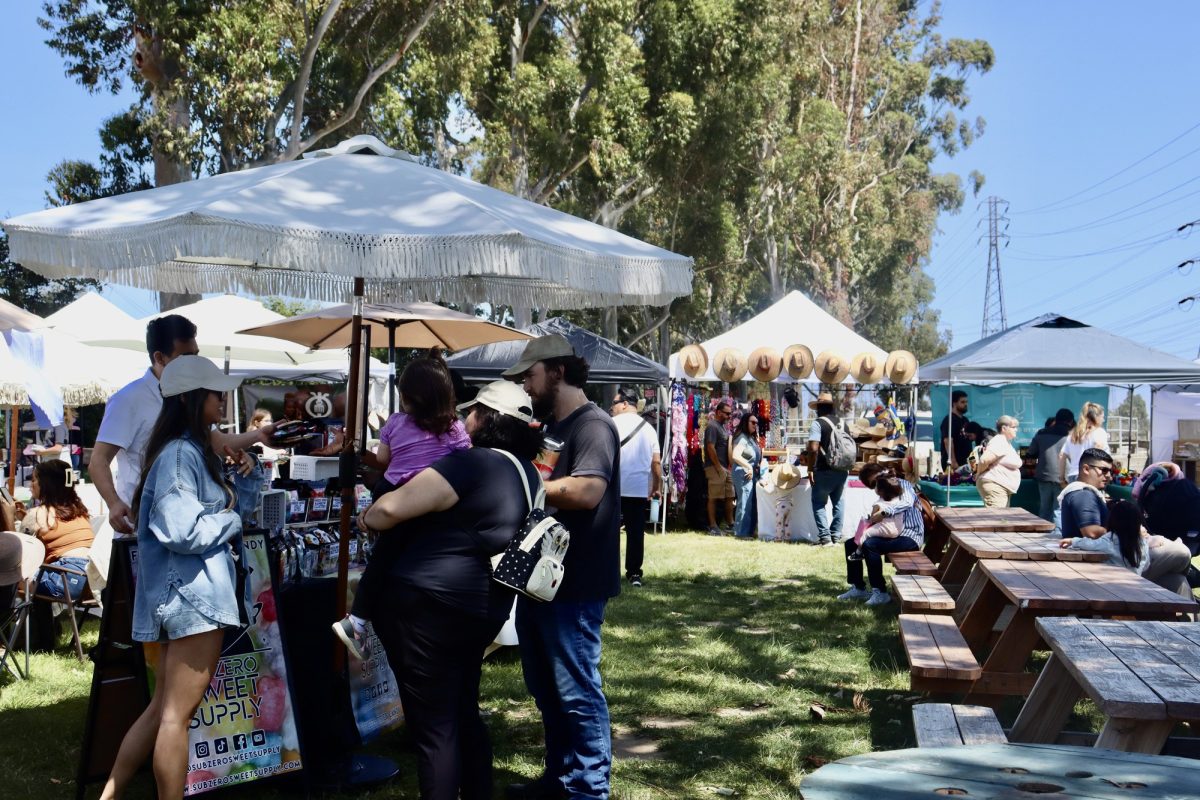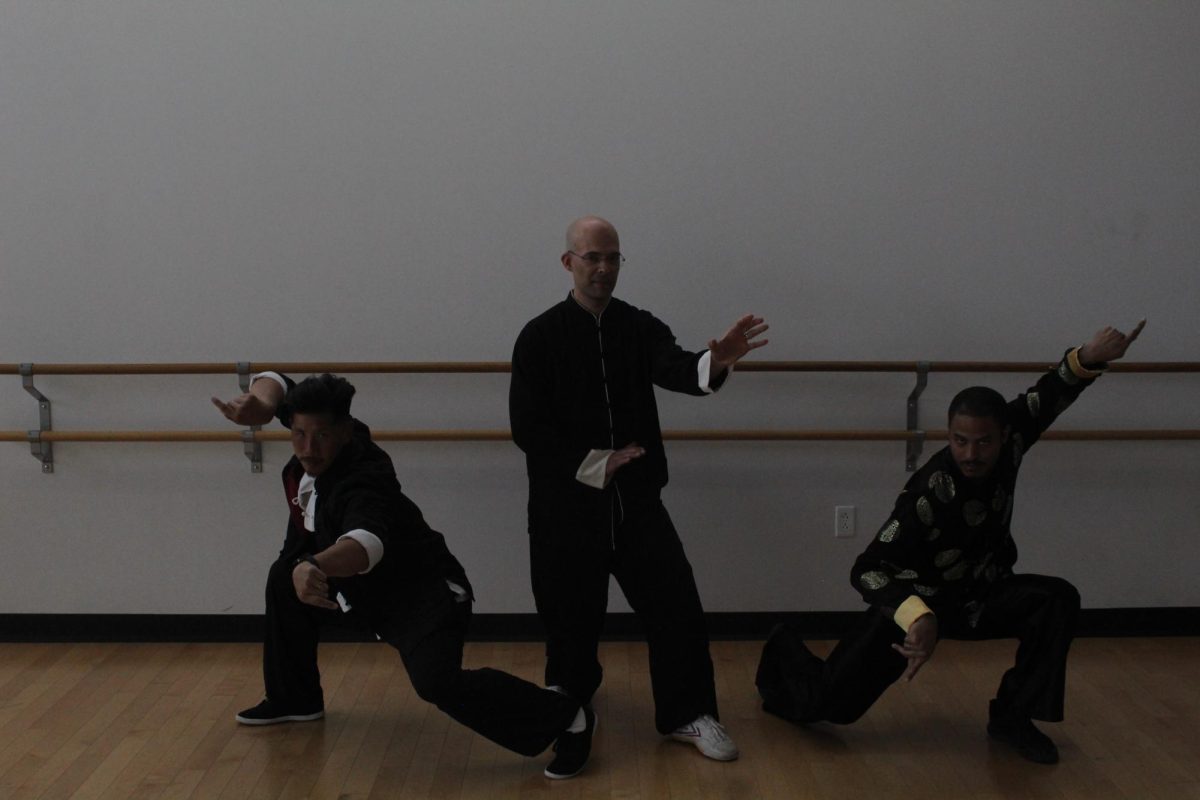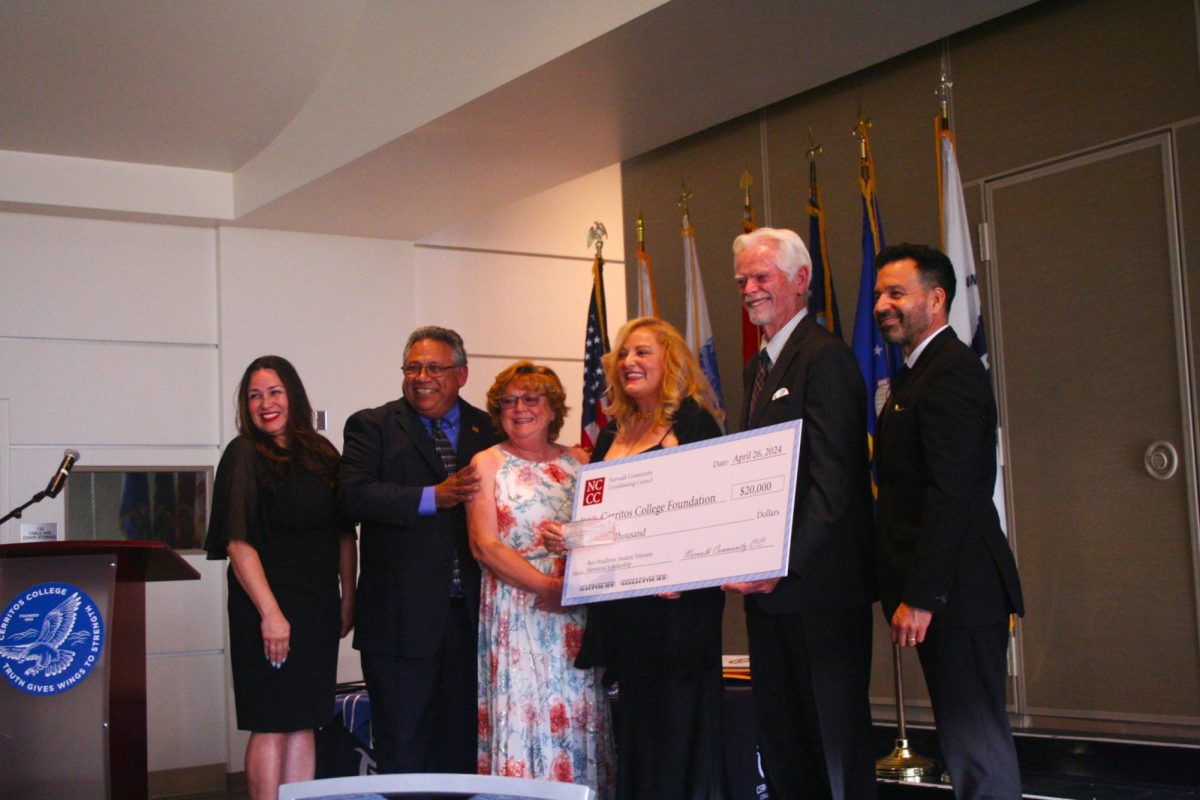Jonathan: Hello, Talon marks, my name is Jonathan.
Edward: I’m Edward Fernandez and today we are investigating Hispanics against immigration. Here we have today…
Tony: Tony Gonzalez.
Edward: Tony Gonzalez, thank you for joining us. Former Talonmarks staff member right?
Tony: Yes.
Edward: Could you tell us, why are you against immigration?
Tony: My grandmother, she got her citizenship. It took her 16 or 20 years to get her citizenship and I just think it’s unfair for all these illegal immigrants-I call them like that; some people don’t like it, but that’s the way I say it-that they come illegally, and they want to grant them citizenship, but what happened to all these people that are in America, that are waiting for the citizenship and they’ve been here for plus 20-30 years, and they’re still pending their status while you have others. They just come right in, and they just get it right away. Not just that, but I read that two thirds of federal crimes are involved of illegal immigrants. So you’re adding violence. You’re making America more dangerous in a way. I understand that they’re trying to leave their country for a better place, but at the end of the day, you gotta do it the right way. Back then they used to grant people citizenship-not citizenship, but social security-and then after that, that’s when they took it off, but that’s how they were able to get here. But even then, it still took her for so long to get in. I kind of understand you having people wait for so long and you have to take a test and not just that in a report from the census in 2021, 70,000 are Guatemalans, 800,000 are Salvadorians and 725,000 are Indians. It’s not fair for people that live in Asia or the Middle East that are waiting for citizenship, but they’re further from the border. So it’s hard for them to even enter the country legally.
Edward: What’s your background? Are you Mexican?…
Tony: Mexican and Guatemalan.
Edward: Why do you think they come to the U.S.?
Tony: I think they always say for a better life and that’s my only problem because if homelessness is already up, housing is already up, how are we going to help out another country? Help out other people when we’re struggling within ourselves?
Edward: What would you say is your main problem with immigration?
Tony: Well, one thing is also that they were signing free health care to illegal immigrants in Los Angeles and that’s really unfair for Americans that don’t even have health care and health care is probably like the most important thing. How are you going to get people that are not citizens health care while we’re struggling with health care. That makes, that makes zero sense to me. Not just that, but in comes higher taxes and everything comes-it’s not just free, we have to pay more. If rent is already expensive-people are living day-to-day jobs and if they get fired, how are they going to be able to feed their family, and pay the rent? What’s what’s next for them? Most likely they’re going to be homeless. If you’re prioritizing more immigrants, then most likely they’re gonna get some housing while you’re struggling to, to get a job. Not just a job, but like, if you want to get a job, there’s a lot of applications and it’s hard, and you still have to wait. When you get unemployed, you only get $400 a month and like that’s not even-or probably a bit more, if I’m not mistaken-but you still don’t-that’s not enough to feed your family or to get housing.
Jonathan: When you talk about your status on immigration, what do you think about it, do other Hispanics look at you kind of weird?
Tony: Oh yeah, they give me the racial terms that they say they’re not racist, but they say, “Oh, you’re not Hispanic, this and this.” Like, Come on, man, it’s a two-way street. Just because people have different ideologies, doesn’t mean that you’re racist, and all that. I mean, there’s some degree where if you slur things out, like the N word, or you call people like the beaner, and all that, like, obviously, that’s, that’s racial terms. You’re being racist. If you can prove data, then at the end of the day, data is not been racist. That’s my perspective.
Jonathan: Do you think a lot more Hispanics right here should be more concerned about illegal immigration than they are right now?
Tony: I think they should. I mean, like I said, two thirds of federal crime is happening and not just that, Governor Newsom is like very, very light on crime. So I mean, if they’re always like, doing home invasions, or they’re stealing, like cars like, I mean, it just causes more issues for you and more financial issues for you. A lot of people don’t see it that way because they’re more like, “Oh, it doesn’t bother me so I mean, it shouldn’t matter.” But until it happens to them, they’re gonna be like, “oh, you know what, it is an issue. So the way I see it, it’s only an issue when it bothers you, but when it doesn’t affect you, people just stay quiet.
Edward: Do you feel isolated at all by the Hispanic community?
Tony: I could care less.
[All laugh]
Tony: No, I could care less because I mean, at the end of the day, when you die, you’re just gonna die alone. I could get along with people I get along with-other ethnicities. It’s not an issue. When they’re straight liberals or progressive, then yeah, it’s an issue. Those are the people you kind of don’t want to talk to because they’re very close minded. Even some conservatives they’re very close minded. So those are the people you kind of don’t want to-because if they’re very hard headed, you’re not gonna get anything through to them. At the end of the day, just try to change people’s perspective on those who you know that are more open-minded compared to those that are close-minded.
Edward: I don’t know, right? It’s kind of hard as a Hispanic person, because historically, we have roots in like, at least California, right? So it’s also kind of hard to see people who look like you, getting treated kind of poorly.
Tony: Just in general, I think it just depends on the person. In my perspective, the three things that always divide people is politics, religion, and sports. Those are the three things that always separate families. The way I see it, politicians, at the end of the day, they’re gonna live their life, they’re still going to be millionaires, they’re still gonna have a good job. And while we’re fighting with each other, at the end of the day, they’re still living good. When it comes to religion, there is no right or wrong religion. It’s what you believe in and what what faith do you have. And when it comes to sports-like a Super Bowl-I lost money, I’m over here, I’m-I’m gonna have a good time. But there’s other people that be texting you, be calling you, like, “Oh, this and this and that.” If you want to get mad over something that you can’t control, then you can frustrate yourself even more. But if you’re just gonna brush it off, then it doesn’t really affect you in a way.
Edward: That’s an interesting thing you just said. Feel free to clear the record, but I don’t know, it kind of sounds like you’re kind of dismissing they’re suffering because you choose not to relate to it.
Tony: What examples do you have for me?
Edward: The way you were saying, “Oh, I choose not to let it affect me when you’re talking about sports and stuff.”
Tony: No sports, politics, religion in general. If someone says you’re wrong, then I mean, that’s your belief, but I just know that I’m gonna stick to my morals and stick to my belief, but if you’re trying to downplay someone then I mean, it all affects on you. If you want to take it the wrong way, which some cases it might be the wrong way, but it’s just better to be the bigger person and just like, “Alright, you know what, I’m not gonna let this person affect me. I know what I stand for. And I know what I believe in.”
Edward: Do you feel any connection, any ties to these people coming?
Tony: I understand that they’re coming for a better country, but you got to do things the right way. And if you want to get a promotion and you have more experience, your work ethic is better, but then you have people get promotions based on color. I don’t think that’s right. Disney was firing white people just because they were white. Now imagine a white executive firing people because they’re Blacks or Mexicans. “Oh no, it’s a problem.” A lot of people are gonna say, “Oh, well white people have more opportunities, this and this, but at the end of the day, everyone has the same opportunities, it’s just based on how you do in the outcome.
Edward: Could you tell me about your grandma’s process?
Tony: Well, she was waiting 17, 18 years to get her citizenship and then she went to the immigration building and she took a test and it was like three questions, but she had to study over 100 questions. They were gonna ask her from any of those 100 questions and ask her three questions and if she was to get those three questions, right, they grant her, her citizenship.
Edward: Your grandma was from Mexico or Guatemala?
Tony: She was from Mexico.
Edward: She applied for it starting when she was in Mexico?
Tony: When she was already here. So she came here when she was like nine or 10 years old. My grandma’s 80.
Edward: She came in legally or illegally?
Tony: Illegally.
Edward: Around when did she start her process?
Tony: When she was about like 10 years old, 11 years old. At that time, they were granting people their social security because she was working on fields and all that.
Edward: So she was like a resident until she started the citizenship?
Tony: Yes.
Edward: You mentioned Amnesty. Is that how she got her residency?
Tony: Yes.
Edward: I don’t know, it’s kind of a disconnect, right? You’re saying that there’s a right way to do it and that people should be doing it the right way because others are waiting in line for years-like your grandma waited 16 fucking years. But then she also came here not not exactly the right way.
Tony: I’m gonna give the same answer the Liberals always say, “Things were different back then.” Immigration wasn’t a problem back in the days and now it is. Just like, people say, “Oh, racism was an issue, but now it’s more of an issue now.” And that’s what that’s what they say so I’m gonna just say that.
Edward: Your grandma, at 10, that was the 80s, right?
Tony: Yeah.
Edward: I talked to-you know, Professor Macias? He’s a Chicano Studies professor here.
Tony: No.
Edward: I talked to him and he told me that, in terms of immigration with the U.S., it’s like a pendulum right, because when the economy’s doing really good, immigration is at an all time high, right? But when the economy starts to plummet, then immigration is-there’s like a standstill and a lot of scapegoating. In the 80s there was a huge economic boom. Why do we need immigrants? Why would we allow them in times of economic success? Probably because we want to use cheap labor, especially with the Braceros program. You heard about that? The San Diego thing?
Tony: No.
Edward: Bringing immigrants over from Mexico to work the field in San Diego, pretty much. If you say because times were different, I agree. Times were different, but kind of in a hypocritical way, right? Because we’re still allowing them to come over, but in exchange for their labor, you know?
Tony: I get that but quick question. Are you an Obama supporter?
Edward: I’m pretty apolitical when it comes to specific politicians especially.
Tony: So like Obama. Obama was first deporting so many people, but since-with all due respect- he was black, no one was saying it was an issue. But then when you have Trump deporting all these people, “Oh, he’s racist, because he’s white.” And not just that, they were trying to portray Donald Trump putting all these illegal immigrants in cages when Obama did it. No one was saying anything about Obama. I mean, you can say news media, but people in our generation, they don’t know stuff about that. So it’s just kind of like a two-way street in a way, just like where I’m getting to you.
Edward: Yeah. To that, I absolutely agree. There was a clip before of Biden a couple of decades ago or some shit. Where he was saying, like, “Oh, I do not agree-
Tony: “…Bringing my kid-”
Edward: “…With like, gay marriage,” or whatever. And now he’s all for it. Politicians, you know, they’re not worth shit. I guess, it’s weird to pinpoint a certain politician because we can say, “Oh, Reagan was like, super good for immigrants,” or whatever, but that was kind of a product of its time, I would say, just because of the economic boom. Around Obama-I’m not an Obama dick rider or anything-
[Jonathan and Tony laugh]
Edward: …but his presidency was-the crash. The big crash. So yeah, probably around that time is when we’re starting to get hard on immigration. I don’t think it’s a thing about pointing at politicians and kind of comparing and contrasting. I think it’s a recurring issue with the times, with economic ups and downs, but I think it’s hypocritical to have different stances for those turns, you get me?
Tony: Yeah, but I think in general you can state a lot of things are hypocritical. Like back then Democrats, they were the racists back then. Even now-how you said it-there’s been videos of Joe Biden saying, like, “I don’t want my kids going to schools with-” I don’t know, if he said “monkeys” or “Black kids”. That’s what he said. There was a video like that. I don’t know if he said “monkeys”, But he said, “with Black kids.” Now we have a lot of people just when it was the race of Joe Biden and Trump people were saying, “Oh, I’m not going to vote for Trump, because he’s a racist.” While a person back then was being a racist. So in general, you can say there’s a lot of things that are like, two-way–not a two-way street, but there’s always like how you said, there’s always slopes. And politics, there’s no, in my perspective, there’s no right or wrong, because at the end of the day, like everyone has different ideologies, maybe there is a right or wrong, but everyone’s going to think differently.
Edward: I don’t know, I just think it’s kind of hard to see somebody who looks like you, who you know, you guys speak the same language, you have maybe the same culture. The numbers you brought up–that’s a lot of Guatemalans trying to come into the U.S., you know. So to–
Tony: Deport all of them!
[Tony slams his fist on the table]
Edward: God damn.
Tony: Deport all of them.
Edward: That’s an interesting stance.
Tony: Deport every illegal immigrant.
Edward: Why, though?
Tony: Why? I just said it–two thirds of federal crime. So we’re not gonna act like federal crime is a big deal, but if two thirds of federal crime increases and it’s due to noncitizens, why wouldn’t you want to deport?
Edward: Like violent crimes?
Tony: Yeah. Violent crimes. Why wouldn’t you want–you could be at the wrong place at the wrong time and sooner or later, you die or your kid dies and then you’d be like, “Man, what could I have done differently?”
Edward: Just to kind of nail it down. What you would say is what gives you–or what makes you anti-immigration is this federal crime statistic?
Tony: Yeah. I mean, when people say–because I also hear conservatives say, “Oh, they’re stealing jobs,” but I don’t agree to that because the jobs that they’re getting is field jobs. I don’t care what anyone says, a lot of people wouldn’t want to work field jobs. And there was even a study that Americans, when they were trying to do the field jobs, they were not doing as fast as Hispanics. They [Hispanics] were doing it way faster, they were having more quantities compared to those Americans that were just slow. They didn’t want to do so much. And when they say they’re stealing jobs, I don’t believe that they’re stealing jobs, but they just–when it comes to crime, when it comes to homelessness–if they’re going to enter the country illegally, where are they going to stay at, if we’re already dealing with housing. In New York, landlords, they were housing illegal immigrants in hazardous places. There was pollution. There was no fire detectors. So I mean, if there’s a fire, everyone’s practically gonna die because they don’t know. It just happened three or four days ago–I’m not too sure–that a guy was charging $300 per person, and it was in a small room with 60 people. You’re not going to tell me if someone gets sick, they could spread more diseases and all that?
Edward: Yeah, that’s pretty messed up. But I mean, those examples are kind of what liberals might use to defend the undocumented experience. If we’re talking crime statistics, I do agree with you. Whoever commits those crimes, they don’t belong here if they’re going to be starting violent crimes.
Tony: But how are you going to know they’re starting violent crimes or not?
Edward: After they commit them. I don’t believe in punishment before the crime. How can you even anticipate that?
Tony: Yeah, you can’t, but that’s why if you let them in you let everyone in and by the time you know it, they commit a crime and then they start moving to other places.
Edward: Crime is kind of inevitable, right? These people are coming to the U.S. for a reason. They want the economic opportunities available here. To shut them out because there’s going to be some bad people in the bunch is kind of messed up.
Tony: I don’t think it’s messed up. I think you gotta worry more about your citizens.
Edward: It’s interesting that you say that. In your own example you’re talking about farm workers being so necessary to our economy.
Tony: Yeah, those are the people that live in Mexico–like you said–that are in the program and those are the people doing those jobs.
Edward: So we do need immigrants coming in. I’m sure if the U.S. wanted to, they could’ve been solved the problem by building a huge ass wall. The problem I see is that we as a country need that immigrant labor. So no matter what, I don’t think they’re ever going to stop immigrants from coming in.
Tony: No. They’re always gonna find a way.
Edward: You want to deport them, even though they’re kind of unnecessary for our economy.
Tony: Still. Deport all them.
Edward: But then our economy is gonna crumble.
Tony: That’s why you have people in programs. You have people that are–well, I had a family member; she would live in Mexico and she would take the bus every day. Go at the border and start working in the fields.
Edward: I see that, but it’s also very exploitative, because that’s sending the message that, “we want you from this poor country, we want you to work our laborious jobs that don’t require any higher education. Very menial tasks. But you’re not welcome here.
Tony: I have a question. If you’re a doctor or you’re a lawyer, and you and your curriculum is in California, can you still be a doctor or lawyer at a different state?
Edward: I think there’s different–
Tony: You can’t.
Edward: Yeah, there’s different licenses per state.
Tony: Its the same thing with illegal immigrants. If they’re an engineer, they’re an architect and they come to the U.S. their curriculum is different from ours. So how are they going to get those jobs?
Edward: Yeah, I totally understand what you’re saying, but even if some of them are like doctors from Mexico, and they’re coming into the U.S. to do that farm work, I’m pretty sure while they’re doing the farm work, they’re not thinking, “Man, I really love doing this farm work.” I’m pretty sure they’d rather be doing medicine in the U.S. I know what you’re saying that even if they could–
Tony: They can’t.
Edward: …They’d still need the proper American qualifications or whatever, but just thinking of that scenario: a doctor coming in and doing farm work. That’s like textbook exploitation.
Tony: They already have good jobs. I doubt they will want to come to the U.S.
Edward: There’s hyperinflation in Mexico though. That’s on top of the fucking cartel running the entire country. Technically, I don’t think Mexicans specifically count as asylum seekers because there’s very strict requirements for what constitutes–I think you have to be running for political reasons for blah, blah, blah, blah, blah, blah. But under there, it’s not like, “Oh, for economic reasons. You can come seek asylum.” There’s an economic crisis in Mexico, being exacerbated by cartels. I think they have very valid reasons. And I think the U.S. is stopping them for kind of arbitrary reasons.
Tony: Where are those illegal immigrants going to stay at? Where are they going to live at? Because in New York, that’s what they were doing. They were busing those people out in New York and a lot of those people, there was even reports on this, this was from a week or two weeks ago, people in New York that were illegal immigrants were going back to their country because they didn’t want to live there.
Edward: in New York?
Tony: In New York. Because it was hazardous and the way they were living it was just bad. So we’re gonna store them in a worse spot where they could possibly die, compared to their own country. They were leaving wherever they had wherever they were keeping them. They left there so they can go back to their own lives.
Edward: How did they get to New York? You said they got there from a bus, right?
Tony: Yeah. They bused them from Texas. From Texas they moved them to New York. And then, from what I know, they only get a month of housing and from there, they kick them out in the streets.
Edward: And then they leave because they don’t like New York?
Tony: No, no, no. Some of them that did want to stay, they’ll give them housing for a month and after a month, they will kick them out and they were on their own. How are we going to say, “Oh, yeah, we should care for these illegal–we should, in a way, because there are people at the end of the day–but how are we going to take care of them? When at the end of the day, they’re getting kicked out from the housing and where they’re going to stay at with their family? Where are they going to live at? In the streets? No, they’re gonna live in the streets and they’re gonna freeze to death and they’re gonna die.
Edward: Well, number one, how they got to New York seems very fucking illegal, right? Like, what the fuck?
Tony: No. Exactly because a lot of people like Chicago and New York, California, they’re all saying, “Oh, we should do this for these illegal immigrants. And that’s what Governor Abbott–he was like, “Alright, you guys want to say we’re for them? We’re going to take them out to your city so you can deal with them.” And even the governor from New York said, “Oh, we’re having a crisis with illegal immigration.” So a Democrat from New York is saying, “Oh, we have a crisis over here.” It’s a problem, but then at the end of the day, when they’re all falling on Texas. Like, “Oh, Texas, you deal with it, but we should still let everyone in.” Like okay, if that’s the case, like I said, it’s not a problem until it affects you. Then that’s when they took them to New York and they took them to Chicago and you could even say some right here in California all of a sudden, it’s an issue now.
Edward: To that I would say, they’re coming into Texas… into Texas. It’d be a different story if New York was on the border. That’s why in California, New Mexico–
Jonathan: Arizona…
Edward: Arizona, Texas, [there are ] huge populations of Mexicans. I don’t want to say because they’re better equipped. You know, New York is all the way fucking up here, right? Immigrants are coming in to these down here states. So of course they’re gonna be more prepared, quotation marks. Yeah, New York is gonna get blindsided because at the end of the day, what Governor Abbott did was a political ploy. To get–
Tony: No, it’s the right way to do it. If you want all these people to come into America, alright, then you guys deal with them.
Edward: But check it, New York is not prepared for that. Of course, there are immigrants in New York. You know, the Cubans–
Jonathan: Puerto Ricans
Edward: Puerto Ricans, Ethiopians, but how did they get there? Because they got established from wherever they came into and then went to New York versus these down here states were more “prepared” to take them in.
Tony: But it’s not about being prepared or not.
Edward: Yeah. but what I’m saying is that they had to be “prepared” because they’re on that border. Where immigration is obviously going to happen.
Tony: You do know that a lot of CBP, they’re declining applications. So if you’re declining applications–if Border Patrol’s declining applications, what’s the best thing to do? Send them in a place where the city or the state is saying lets all bring them in. So at that point, you don’t have to deal with all that hassle because at the end of the day, they’re gonna get shit on for being racist and for deporting all these other people. Alright if that’s the case, you’re gonna go to a state where they say they want you, but then when once they get you, they don’t know what to do with you. So how are you going to say, “Oh, bring them all in, but you guys need to know how to suit it. We don’t.” But then when once they bring it to you guys, it’s a problem. Come on man. You can’t be saying bring illegal immigrants in when you don’t even know what to do with them yourself. New York itself is in a hassle. The rent is going up; they’re staying in–I think–Jersey to go to work in New York. Like come on man, because rent is going up. How are you going to deal with all these illegal immigrants when a lot of people in the states are leaving their hometowns so they can live at a cheaper place. And the drive is like–my father works in Palmdale.
Edward: God damn.
Tony: Because he works for Lockheed Martin, the aerospace company. Well, we live here. Going, it’s like an hour and five minutes, an hour and 10 minutes, but coming back to here, he does at least two hours. Two hours and 30 minutes. Now imagine over there in New York with all the traffic and all that as well, you’re gonna deal with that all on a daily basis. It’s gonna get tiring. Like I said, the rent over there is cheaper, but there’s not that many jobs over there. Like if you go–like Jersey does not have good jobs like in New York. And in New York, you got to be a stockbroker. You gotta have those type of jobs to live in New York as of right now. Where are they gonna get those jobs? I’m pretty sure a lot of us wouldn’t want to do an hour and 30 drive every day for plus 20 years.
Edward: You kind of said a lot there. The interesting thing about the end there was immigrants are not going to necessarily get the kind of jobs that we can get for a bunch of reasons. Number one, employers are not going to want to hire them. Number two, they need, they need a social security number to get a job, like a legit job. A lot of them are doing under the table stuff or sometimes, you know, sometimes people, you know, get these fake social security cards so that they can work at a more legit place, but that’s not going to fly on an upper level. You’re not going to be able to get a job–a career–using a fake social security card. Where we’re going to house them? That kind of works itself out. Not to excuse it or whatever. A lot of the homelessness that we’re seeing is not necessarily coming from immigrants coming in.
Tony: Yeah, no, that’s what I’m saying. If we’re having our own problem with homelessness, people losing their jobs, there’s a lot of tech companies, corporations that are leaving California and New York. Why? Because of high taxes and that loses jobs that loses a lot of stuff and that lowers down the economy. And so where are those illegal immigrants gonna work at? Even target, they’re even leaving New York.
Edward: You’re speaking in terms of like the very new guys that are coming in. Even fucking right across the street, we see those day laborers working for their daily bread. Eventually they do find their jobs and I think it’s important that we have some level of social net so that people can bounce off of that. Because eventually they are going to contribute in terms of taxes. But everything that you just said, funnily enough, is kind of what I was saying: when the economy is not doing so good we tend to scapegoat undocumented immigrants coming in.
Tony: I don’t know when people are paying high taxes–I even read a study that it was like, “99% of the taxes are from the 1%.” So I mean, if they’re getting taxed from California–even the sports, Dana White said he’s never doing an event in New York or somewhere around there because they get high taxes. And even corporations like Target and all these high techs, they’re leaving states where they’re getting lots of taxes. If they’re leaving those states there’s a lot of jobs that are being lost. Ford even left and what about all these people that were working at Ford? They lose their jobs and what then?
Edward: Interesting again, you say that because, I don’t know if you saw recently like the Walmart thing. This year alone, they’ve had record high profits and yet, a bunch of their full time employees are on food stamps. When you talk about corporations needing these tax breaks, I think they’re bullshitting. They just don’t want to pay, man. They just want to hold on to their profits. I think a lot of the times what causes them to move to like Mexico, is cheap labor. Like how we pull them in to work the fields.
Tony: Cheaper labor and cheap material.
Edward: Yeah, exactly. Exactly. Because that’s how the engine of capitalism works. And I think they’re [corporations] moving not because they’re bleeding for money. I think they’re leaving because they want to hold on to as much profit as possible. Like they said in the Trump presidency era, it was the best time for billionaires. How much money does a billionaire need to hold on to? A billion is a lot. A million is a lot.
Tony: The way I see it, it’s their money so they’re allowed to do whatever they want.They work to get where they’re at and that’s their decision.
Edward: Would you say that even though percentage wise, you’re paying more taxes than they are?
Tony: I don’t think so because they have a lot of employees. And like I said, 99% of the taxes are from the 1%. You can add up everyone, all the citizens that are not the 1% and it still doesn’t match what they’re matching.
Edward: I’m kind of skeptical about that statistic to be honest. 99% of taxes?
Tony: It was 99 or 90% if I’m not mistaken.
Edward: I’m still kind of skeptical about that.
Tony: [Turning towards Jonathan] Google it! Google it!
Edward: Yeah, google it! No, I’m just kidding. Aside from taxes already being pretty lenient, for the rich, there’s fucking so many tax breaks that they can use to–even just being a landlord. You get tax breaks for having a tenant living there too long, because then it counts as a depreciating asset. Even though everyone fucking knows that houses are not a fucking depreciating asset. Especially as we see the markets just getting higher and higher. Having no tenants at all makes it count as a loss of income. There’s a tax break for that. Paying for repairs, paying for the labor, tax breaks for that. So there’s a million different tax breaks that these guys use to get out of their fair share of taxes. I mean, that’s always been the case. Even in the Reagan era, Reaganomics, the trickle down economics, it didn’t work. He made it more lenient for the rich in the theory that because they would have more wealth available, they would invest in the economy through commerce or paying their employees higher salaries. It didn’t happen. I think, at the end of the day, the rich people are not our friends, they’re not here to help us. They’re here to hold on to their wealth. And I think that’s what’s causing a bunch of these problems.
Tony: You’re right, but if you have so much money, at the end of the day, you’re not going to want to lose as much. If you grew up not poor or not the best, once you make that amount of money, you’re not going to want to spend as much money as you can. You’re going to try to keep as much as you possibly can. If anyone that becomes a millionaire, or someone has money, I can guarantee you at the end of the day, they’re not gonna be like, “Oh, let’s give out as much money as we can.” There are some, but not a lot. One example, if you have a house or you’re renting a house, and you bring in illegal immigrants to your house, you get like money. But I can guarantee you a lot of people wouldn’t be like, “Put them in your house and all that.” So why don’t you put them in your house?
Edward: To your first point: Yeah, everybody wants to hold on to their money. The problem with that is, I also want to hold on to my money and I’m not a fucking millionaire. I don’t have money to spare. We want to hold on to our money. The problem is we can’t. They’re going to take our fucking money. And if we try to stir anything about it, they’re gonna audit us–it’s just problems for us. Versus when these guys do it, they already have so much money, to not pay your fair share of taxes, especially when percentage-wise, we pay way more than they do is pretty absurd. I would say I agree with you, everybody wants to hold on to their money, but at the end of the day, we should all be paying a proportionate amount. The problem is they’re getting away with not.
Tony: I agree with that, but at the end of the day, it’s their money and they’re allowed to do whatever they want and since they have more money, you get more–like you said it–tax write offs, and all that.
Edward: Unfortunately, I’m seeing that we are kind of on the same page. Them holding on to their money is what’s causing a bunch of these problems because where would that money go if we were able to tax them like how we get taxed? It would go into all these social issues within the United States. It would be going to health care. It’d be going into housing. It’d be going into a bunch of these other stuff.
Tony: I have a question. Is there any sports that you like?
Edward: No, I don’t watch sports.
Tony: [Turning to Jonathan] Any sports that you like?
Jonathan: Yeah.
Tony: What sports do you like?
Jonathan: I like MMA.
Tony: All these athletes that are making so much money, but then we never talk about them, about the stuff they do when they spend their money? Like Dak Prescott. If Dak Prescott’s making all this money, then why is he helping out his community? But when you talk about Jeff Bezos and all these other people, they’re like, “Oh, yeah, bro, you make so much money. You got to do this and this.”
Edward: You said it yourself: we don’t talk about how they spend their money. There’s a difference between spending and getting taxed. No matter what, money is being taken from me. They are not having money taken from them like we are. Also, these athletes and musicians and celebrities are millionaires. Jeff Bezos, Elon Musk, Mark Zuckerberg, they’re billionaires. That is an astronomical difference. I saw a thing where like a million seconds is 11 days or something, a billion seconds is like 36 years. That’s an astronomical difference. There’s this great quote from Chinatown. Have you seen Chinatown?
[Tony shakes his head]
Edward: There’s this great quote where the guy, the fucking detective guy goes to the old rich white guy and he’s like, “How much money–” because he’s [the old rich, white guy] doing some bad stuff, fucking over the people to get more money. But he’s like, “How much more money do you need? What do you want that you can already get?”
Tony: When I was working at the Super Bowl right here at SoFi stadium–this what I’m going back to–there was a random guy that goes up to one of the workers and he tells him, “I’ll charge you $20,000 per person, but you get full credentials.” If you just added 20,000 plus 10 people, bro, you’re cashing out big time. You’re probably making the same amount that you’re doing in your job. At the end of the day, everyone’s still kind of finding a way to cheat the system.
Edward: But is that what’s moral?
Tony: I don’t think it’s moral, but at the end of the day, it’s your life. You decide on how you want to live and what you want to do. You can’t tell people–like when people are like, “Oh, Jeff Bezos, he has so much money that he can help out the world and this and this.” But at the end of the day, he worked to get where he was at, and it’s his money, so he can do whatever he wants. You can’t tell a person what to do with their money.
Edward: I agree with that to an extent. He should be able to spend his money however he wants. But when it comes to taxes, what we all have to go through, there’s no escaping taxes. For us to get taxed at a higher percentage than like these billionaires is–
Tony: But what do we own? What do we own compared to them?
Edward: I don’t see how that’s relevant, though. It’s based on income.
Tony: If you have property–
Edward: Yeah.
Tony: …And if you have all this stuff, then obviously you’re gonna have more tax write offs. And especially if you have employees, you’re gonna have more tax write offs.
Edward: To an extent, tax write offs can only get you so far when it comes to defending one’s desire to hoard their wealth.
Tony: Like my President Donald Trump, baby!
Edward: This fool. Amen, brother.
[Jonathan and Tony laugh]
Edward: I’m sure you’ve seen memes where it’s like, “Bro, like you’re making $65,000 a year, why are you defending these billionaires?”
Tony: Because it’s their money, they could do whatever they want.
Edward: They don’t care about you.
Tony: Obviously they don’t, but that’s why I said, you worry about yourself, you do your own thing.
Edward: I don’t think anybody’s coming into the United States with the idea that they’re going to leech off the system indefinitely. Everybody wants to make something of themselves, they’re not coming in from these other countries, because they want to live on the streets and get paid, whatever government assistance. They want to come in, work and have dignity and live a good life. And eventually, once they get on their feet, they’re gonna contribute in taxes, in labor and the value that they present through their employment, or whatever. It’s a hard idea to accept that people should be completely isolated and have their success depend on their own drive, but it’s exacerbated when we talk about these billionaires. If they did pay their fair share in taxes, a lot of our problems would be solved, I argue. Like the potholes on Alondra Boulevard, you know, would it be fixed. We’d have probably a minimum wage that reflects what we minimally need to live.
Tony: And what’s that like $20 when bread and all that’s gonna go up?
Edward: $20 For fast food workers. Interesting you mentioned that. There’s an asterisk on that. You get $20 an hour if you work at a fast food spot, unless that restaurant is a bakery and then you get paid the regular 15. Why is that? Because fucking Gavin Newsom’s, buddy owns a bunch of Panera’s. And you know, that’s another example of rich people trying to fuck us over because they want to hoard their wealth.
Tony: I guarantee you half the school voted for Governor Newsom instead of Larry Elder.
Edward: I don’t know what to say to that. Maybe. I don’t know. Personally, I don’t think we should put our faith into politicians. I think we all agree to that.
Jonathan: Yeah.
Edward: Politicians, they’re just a bunch of self serving leeches. Similar, I would argue, to billionaires and they need to both be held responsible. Do you have any last minute thoughts?
Tony: No. I mean, it was a good conversation. Thank you for having me here.
Edward: Absolutely. We would love to have you again. We kind of ran short on time. But if you’re willing, we’d love to have you again sometime.
Tony: Sounds good.
Edward: Thank you, Tony Gonzalez.





